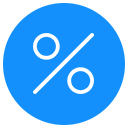Buyer's agent fees and commissions vary widely depending on the agent and how they charge you. Some charge a flat fee while others work on a percentage commission.
Fixed fee vs commission model
Australian buyer’s agents tend to operate on one of two fee structures: a fixed fee model or a commission model.
Under the Australian Consumer Law, buyer's agents must provide you with a single price for their services. The amount quoted to you will typically include GST unless the agent clearly states that GST will be an additional expense.
Fixed fee model
 This amount will vary depending on the level of service you request from the agent (full search, negotiating a sale or auction bidding only), while some agents will also have tiered fee structures based on the purchase price of your property.
This amount will vary depending on the level of service you request from the agent (full search, negotiating a sale or auction bidding only), while some agents will also have tiered fee structures based on the purchase price of your property.
As a general guide, flat fees for buyer’s agents range from a few thousand dollars up to $15,000 for most homes, although they may be higher for premium properties. This fee could also be lower if you only select the most basic level of service from your agent, such as bidding at an auction on your behalf.
Commission model

Fees are calculated as a percentage of the purchase price of the property. Once again, the size of this commission could vary depending on the price bracket your property falls into, and also according to the level of service you select. However, as a general guide, commissions range from 1% to 3% of the purchase price.
To give you an idea of how much you could pay in fees under a commission model, let’s look at the 1% to 3% fee range for a variety of properties:
- $400,000: $4,000 to $12,000
- $500,000: $5,000 to $15,000
- $600,000: $6,000 to $18,000
- $750,000: $7,500 to $22,500
- $1 million: $10,000 to $30,000
- $1.5 million: $15,000 to $45,000
Which fee structure is right for you? This will depend on the service you select and the value of the property you want to purchase. While a fixed fee model may work out cheaper for one buyer, a commission model could be a more affordable option for the next person.
Shop around and compare fees from a range of buyer’s agents to get a better idea of which fee structure better suits you, as well as what represents a competitive price in your area.
How to negotiate your fees to get a better deal
- Do your research. If you’re going to ask for a better price from an agent, it’s important that you go into any meeting well prepared. Find out what the average cost is for a buyer’s agent in your area and use that figure as a bargaining tool to negotiate a fairer deal.
- Be reasonable. Buyer's agent fees are not regulated in any state, so there is scope to negotiate, but don’t insult the agent by “lowballing” them; approach them with a reasonable figure and remember to stay polite and courteous at all times.
- Consider your options. If you’re looking for ways to save money on the cost of an agent, it may be worth your while to consider downgrading to a lower level of service. For example, using your agent to negotiate a sale only is much more affordable than asking them to do a full property search for you.
- Be prepared to walk away. If you’re unhappy with the best possible price an agent offers, walk away. If they’re not willing to charge a reasonable fee for their services, you’re better off looking elsewhere.
Finder survey: How many Australians go direct to a home loan lender after doing their own research?
| Response | |
|---|---|
| I like to conduct my own research | 32.19% |
| I want to stick with my existing bank | 25.99% |
| Nothing - I would always use a mortgage broker | 22.48% |
| I don't trust mortgage brokers | 9.71% |
| I want another specific lender | 5.76% |
| Other | 3.87% |
Are buyer's agent's fees tax deductible if you buy an investment property?
If you hire a buyer's agent to help you purchase an investment property, their fees are generally not tax deductible against your income tax in the year you buy the property.
However, they can be included in the cost base for capital gains tax (CGT) purposes. This provides a tax benefit when you eventually sell the property, as the fees you paid the buyer's agent will be added to the property's cost base, and reduce the amount of CGT you owe.
For example, let's say you buy a property for $800,000 and pay a buyer's agent's fee of $20,000. Then you sell that property 5 years later for $1m. You have made a gain of $200,000. You will be able to add the buyer's agent's fees, plus other costs like stamp duty, to the property's "cost base". In this example, let's assume stamp duty was $25,000.
This means the cost base would become:
- $800,000 purchase price
- $20,000 buyer's agents fees
- $25,000 stamp duty
- Total = $845,000
The capital gain is now $1m minus $845,000, so it's $155,000 instead of $200,000.
Because the asset has been owned longer than 12 months, you're entitled to the 50% CGT discount, so your total capital gain is $77,500.
Sources
Ask a question
More guides on Finder
-
Home loan cashback offers
Home loan cashback deals can help you refinance to a cheaper interest rate and get a lump sum cash payment. Compare the latest deals and check your eligibility today.
-
A guide for first home buyers
Use our complete first home buyer guide to make your first home purchase as stress-free as possible.
-
South West Slopes Bank home loans
A community credit union operating in the south west country area of NSW, helping you find the right home loan.
-
The Capricornian home loans
Compare home loan rates from The Capricornian, a credit union in Central Queensland.
-
Greater Bank home loans
Check out home loans from Greater Bank and apply today.
-
ME home loans
ME is an online lender with a simple range of products, including the Basic Home Loan and the Flexible Home Loan. See their rates and fees here.
-
ING home loans
Thinking about getting a home loan from ING? Compare rates and learn more about this lender.
-
loans.com.au home loans
loans.com.au is one of Australia's leading online only lenders with a range of products that have great features and low costs.
-
Community First Bank home loans
Community First Bank is a credit union that offers home loans in addition to other financial products.
-
Best Home Loan Rates Australia
Learn how to compare rates to find the best home loan and start saving money on your mortgage today.
